人教版2019选择性必修第二册Unit 3 Food and Culture Discovering useful structures课件(共24页)
文档属性
| 名称 | 人教版2019选择性必修第二册Unit 3 Food and Culture Discovering useful structures课件(共24页) |
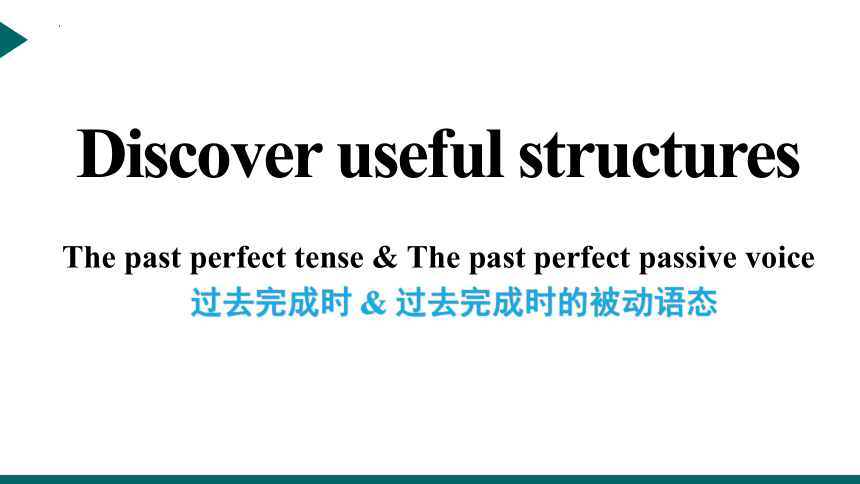
|
|
| 格式 | pptx | ||
| 文件大小 | 513.6KB | ||
| 资源类型 | 教案 | ||
| 版本资源 | 人教版(2019) | ||
| 科目 | 英语 | ||
| 更新时间 | 2024-10-04 00:00:00 | ||
图片预览


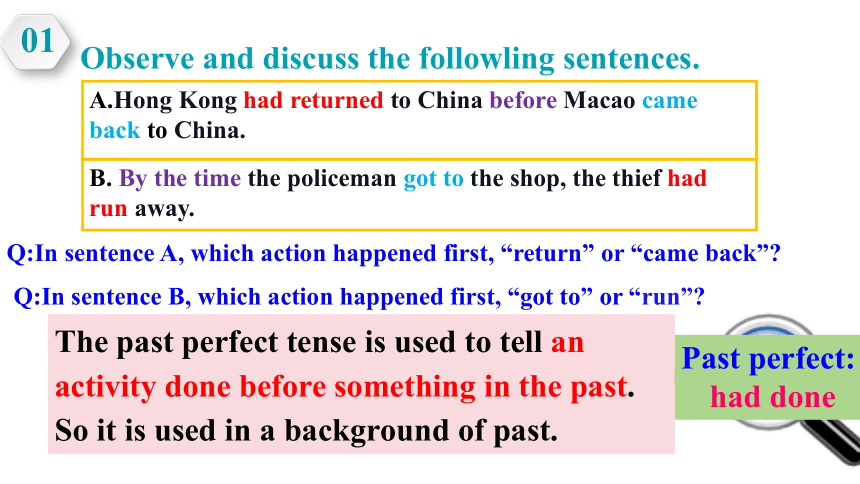

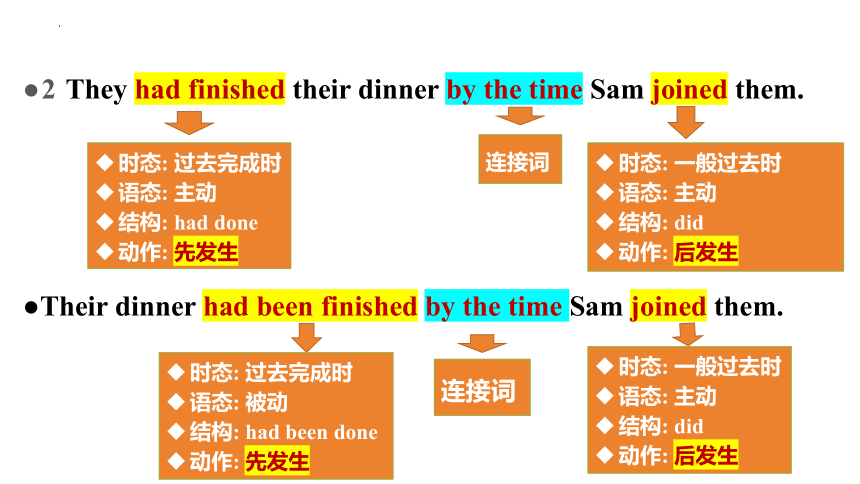
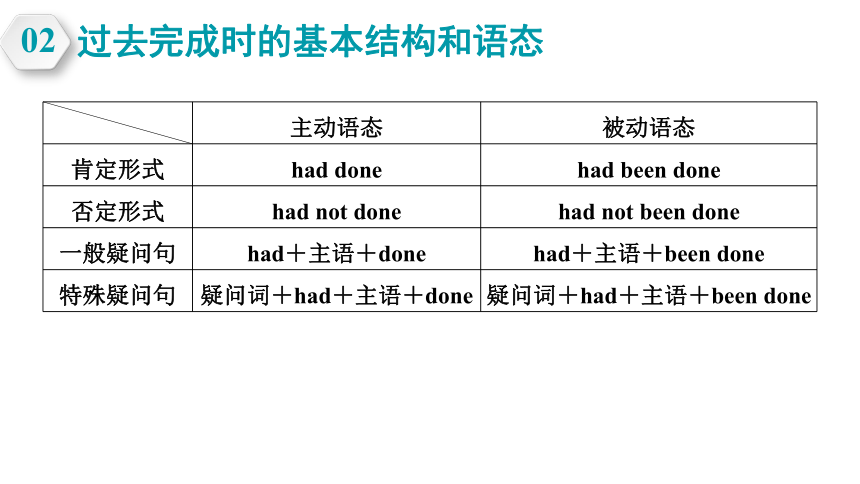
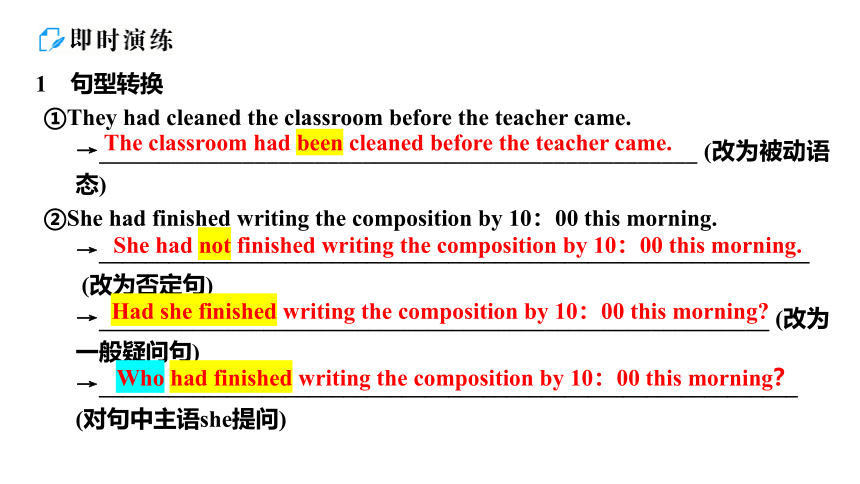

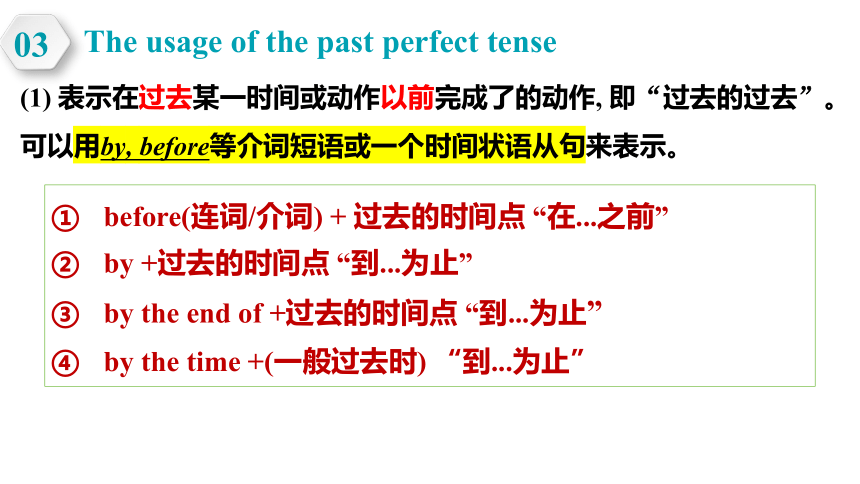
文档简介
(共24张PPT)
Discover useful structures
The past perfect tense & The past perfect passive voice
过去完成时 & 过去完成时的被动语态
1. Observe
观察
01
Observe and discuss the followling sentences.
B. By the time the policeman got to the shop, the thief had run away.
A.Hong Kong had returned to China before Macao came back to China.
Q:In sentence A, which action happened first, “return” or “came back”
Q:In sentence B, which action happened first, “got to” or “run”
present
past
future
earlier past
had returned
came back
had run
got to
Past perfect:
had done
The past perfect tense is used to tell an activity done before something in the past. So it is used in a background of past.
2. 过去完成时的结构和语态
Form and voice
2 They had finished their dinner by the time Sam joined them.
Their dinner had been finished by the time Sam joined them.
连接词
时态: 一般过去时
语态: 主动
结构: did
动作: 后发生
时态: 过去完成时
语态: 主动
结构: had done
动作: 先发生
连接词
时态: 一般过去时
语态: 主动
结构: did
动作: 后发生
时态: 过去完成时
语态: 被动
结构: had been done
动作: 先发生
过去完成时的基本结构和语态
主动语态 被动语态
肯定形式 had done had been done
否定形式 had not done had not been done
一般疑问句 had+主语+done had+主语+been done
特殊疑问句 疑问词+had+主语+done 疑问词+had+主语+been done
02
1 句型转换
①They had cleaned the classroom before the teacher came.
→__________________________________________________ (改为被动语态)
②She had finished writing the composition by 10:00 this morning.
→_____________________________________________________________
(改为否定句)
→_________________________________________________________ (改为一般疑问句)
→____________________________________________________________
(对句中主语she提问)
The classroom had been cleaned before the teacher came.
She had not finished writing the composition by 10:00 this morning.
Had she finished writing the composition by 10:00 this morning
Who had finished writing the composition by 10:00 this morning?
3. 过去完成时的用法
The usage of the past perfect tense
(1) 表示在过去某一时间或动作以前完成了的动作, 即“过去的过去”。可以用by, before等介词短语或一个时间状语从句来表示。
03
The usage of the past perfect tense
before(连词/介词) + 过去的时间点 “在...之前”
by +过去的时间点 “到...为止”
by the end of +过去的时间点 “到...为止”
by the time +(一般过去时) “到...为止”
I ________________(finish) reading the novel by nine O'clock last night.
We ________________(learn) over two thousand English words by the end of last term.
ix hundred trees______________(plant) before last Wednesday.
They ___________(leave) before we arrived at the school.
Breakfast ___________________(serve) by the time I got up.
Examples and Exercises
had finished
had learned
had been planted
had left
had been served
(2) 表示由过去的某一时刻开始,一直延续到过去另一时间的动作或状态,常和for,since引导的时间状语连用。
I __________ at the bus stop for 20 minutes when a bus finally came.
He said he ____________ (work) in that factory since 1949.
had been
had worked
now
A
B
(3) 某些动词可用过去完成时,表过去未曾实现的想法、希望、打算或意图等。
hope
wish
expect
think
intend
mean
suppose
We had hoped that you would come,but you didn't. 我们本希望你来,但你没有来。
I had thought that you would become a doctor. 我本以为你会成为医生。
hardly(scarcely/barely)..(had done)..when..(从句用did)
no sooner..(had done)..than...(从句用did)
注:
主句用”had done”,从句用“did”
主句翻译为“一...”,从句翻译为“就...”
若hardly/scarcely/barely/no sooner(否定词) 位于句首,则主句部分, 用部分倒装,即: had+主语+done…
(4) 一...就
e7d195523061f1c0f0ec610a92cff745ee13794c7b8d98f8E73673273C9E8BE17CC3D63B9B1D6426C348A354AD505654C28F453CD7C8F90EADD06C08281DAED7140E5AAAED5880ECE414DFB6A93B82BE019406867034C3A8500A4827DCF3FBF74A471B736410707E336A01C9ADC9BE02ACCB8DF2121D81636A067B8AE80C6AB6F014154F4E7B7247
总结
一听到这个滑稽的故事,我们就哈哈大笑。
We had hardly/scarely heard the funny story when we burst into laughter.
We had no sooner heard the funny story than we burst into laughter.
当hardly, scarely, no sooner位于句首时,主句应用部分倒装
升级为部分倒装
Hardly/Scarely had sb done sth when sb did
No sooner had sb done sth than +sb did
翻译(升级为部分倒装)
_______________________________________than he went away again.
他刚到这儿就又走了。
__________________________when it began to rain.
我刚离开家,天就开始下雨了。
No sooner had he arrived here
Hardly had I left home
当堂练习(导学案P147)
【实战演练】
Ⅰ 单句填空
1.Yesterday she said that her lost key _____________________(find).
had been found
2.I almost knew nothing about the subject, for I ___________________(not study) my lesson attentively.
hadn't studied
3.He said he ________________(work) in that factory since 1949.
had worked
4.I thought that the letter ___________________(send) a week before.
had been sent
5.She didn't go back home until the work _______________________ (finish).
had been finished
6.Hardly ______ he begun to speak when the audience interrupted him.
had
7.Robert ________________ (want) to attend Peter's birthday party, but an unexpected visitor ruined his plan.
had wanted
8.It was the third time that he _____________(be) out of work that year.
had been
9.We ________________(learn) over two thousand English words by the end of last term.
had learned
10.Six hundred trees _______________________(plant) before last Wednesday.
had been planted
Ⅱ 句型训练
1.That old man often thought of and missed the good time he _______________________________________________
before his death.
那位老人在去世前经常想起和怀念他与妻子一起度过的美好时光。
had had/spent together with his wife
2.It was because the workers _______________________________that they accomplished the task in half the time scheduled. 正是因为工人们被很好地组织了起来,所以他们用了计划时间的一半就完成了任务。
had been well organized
3.A few months before he came to China, Mr Smith ___________________________about the people and culture here.
在他来中国几个月之前,史密斯先生就已经对这里的人和文化有了一些了解。
had learnt something
4.5G terminals ________________________in this company by the end of 2019. (install)
这家公司在2019年年底之前就已经安装了5G终端。
had been installed
5.I _____________________send Peter a gift to congratulate him on his marriage, but I couldn't manage it.
我原本打算在彼得结婚时送他一个礼物来道贺的,可是我没有做到。
had intended to
书P29 2. Complete the two conversations with the correct forms of the words in the box using the past perfect tense or the past perfect passive voice.
cancel, eat, finish, get, taste, tell
1. Carol: _____ you ever ______ any Scottish food before
your trip to St. Andrews last year
Paul: No, not really. But I ________________ about
haggis many times before we went there.
Carol: Oh…Did you try it
Paul: Oh, yes! You know what We arrived late for
supper that day, and so we just ate whatever was
left in the university canteen.We ________________
our meal before we learnt we _____ just ______
haggis!
Carol: My goodness!
Paul: Well, it was not bad. I have to say…
cancel, eat, finish, get, taste, tell
Had
tasted
had been told
had finished
had
eaten
2. Carol: When I got to the teahouse yesterday, I found
nobody there. _____ it ________________
Paul: Oh, I’m so sorry that I forgot to tell you! The get-
together was cancelled yesterday morning
because Sally, the hostess, ___________ into a car
accident.
Carol: Oh, I’m sorry to hear that. Hope Sally recovers
soon!
Had
been cancelled
had got
arrive, cancel, eat, finish, get, taste, tell
Discover useful structures
The past perfect tense & The past perfect passive voice
过去完成时 & 过去完成时的被动语态
1. Observe
观察
01
Observe and discuss the followling sentences.
B. By the time the policeman got to the shop, the thief had run away.
A.Hong Kong had returned to China before Macao came back to China.
Q:In sentence A, which action happened first, “return” or “came back”
Q:In sentence B, which action happened first, “got to” or “run”
present
past
future
earlier past
had returned
came back
had run
got to
Past perfect:
had done
The past perfect tense is used to tell an activity done before something in the past. So it is used in a background of past.
2. 过去完成时的结构和语态
Form and voice
2 They had finished their dinner by the time Sam joined them.
Their dinner had been finished by the time Sam joined them.
连接词
时态: 一般过去时
语态: 主动
结构: did
动作: 后发生
时态: 过去完成时
语态: 主动
结构: had done
动作: 先发生
连接词
时态: 一般过去时
语态: 主动
结构: did
动作: 后发生
时态: 过去完成时
语态: 被动
结构: had been done
动作: 先发生
过去完成时的基本结构和语态
主动语态 被动语态
肯定形式 had done had been done
否定形式 had not done had not been done
一般疑问句 had+主语+done had+主语+been done
特殊疑问句 疑问词+had+主语+done 疑问词+had+主语+been done
02
1 句型转换
①They had cleaned the classroom before the teacher came.
→__________________________________________________ (改为被动语态)
②She had finished writing the composition by 10:00 this morning.
→_____________________________________________________________
(改为否定句)
→_________________________________________________________ (改为一般疑问句)
→____________________________________________________________
(对句中主语she提问)
The classroom had been cleaned before the teacher came.
She had not finished writing the composition by 10:00 this morning.
Had she finished writing the composition by 10:00 this morning
Who had finished writing the composition by 10:00 this morning?
3. 过去完成时的用法
The usage of the past perfect tense
(1) 表示在过去某一时间或动作以前完成了的动作, 即“过去的过去”。可以用by, before等介词短语或一个时间状语从句来表示。
03
The usage of the past perfect tense
before(连词/介词) + 过去的时间点 “在...之前”
by +过去的时间点 “到...为止”
by the end of +过去的时间点 “到...为止”
by the time +(一般过去时) “到...为止”
I ________________(finish) reading the novel by nine O'clock last night.
We ________________(learn) over two thousand English words by the end of last term.
ix hundred trees______________(plant) before last Wednesday.
They ___________(leave) before we arrived at the school.
Breakfast ___________________(serve) by the time I got up.
Examples and Exercises
had finished
had learned
had been planted
had left
had been served
(2) 表示由过去的某一时刻开始,一直延续到过去另一时间的动作或状态,常和for,since引导的时间状语连用。
I __________ at the bus stop for 20 minutes when a bus finally came.
He said he ____________ (work) in that factory since 1949.
had been
had worked
now
A
B
(3) 某些动词可用过去完成时,表过去未曾实现的想法、希望、打算或意图等。
hope
wish
expect
think
intend
mean
suppose
We had hoped that you would come,but you didn't. 我们本希望你来,但你没有来。
I had thought that you would become a doctor. 我本以为你会成为医生。
hardly(scarcely/barely)..(had done)..when..(从句用did)
no sooner..(had done)..than...(从句用did)
注:
主句用”had done”,从句用“did”
主句翻译为“一...”,从句翻译为“就...”
若hardly/scarcely/barely/no sooner(否定词) 位于句首,则主句部分, 用部分倒装,即: had+主语+done…
(4) 一...就
e7d195523061f1c0f0ec610a92cff745ee13794c7b8d98f8E73673273C9E8BE17CC3D63B9B1D6426C348A354AD505654C28F453CD7C8F90EADD06C08281DAED7140E5AAAED5880ECE414DFB6A93B82BE019406867034C3A8500A4827DCF3FBF74A471B736410707E336A01C9ADC9BE02ACCB8DF2121D81636A067B8AE80C6AB6F014154F4E7B7247
总结
一听到这个滑稽的故事,我们就哈哈大笑。
We had hardly/scarely heard the funny story when we burst into laughter.
We had no sooner heard the funny story than we burst into laughter.
当hardly, scarely, no sooner位于句首时,主句应用部分倒装
升级为部分倒装
Hardly/Scarely had sb done sth when sb did
No sooner had sb done sth than +sb did
翻译(升级为部分倒装)
_______________________________________than he went away again.
他刚到这儿就又走了。
__________________________when it began to rain.
我刚离开家,天就开始下雨了。
No sooner had he arrived here
Hardly had I left home
当堂练习(导学案P147)
【实战演练】
Ⅰ 单句填空
1.Yesterday she said that her lost key _____________________(find).
had been found
2.I almost knew nothing about the subject, for I ___________________(not study) my lesson attentively.
hadn't studied
3.He said he ________________(work) in that factory since 1949.
had worked
4.I thought that the letter ___________________(send) a week before.
had been sent
5.She didn't go back home until the work _______________________ (finish).
had been finished
6.Hardly ______ he begun to speak when the audience interrupted him.
had
7.Robert ________________ (want) to attend Peter's birthday party, but an unexpected visitor ruined his plan.
had wanted
8.It was the third time that he _____________(be) out of work that year.
had been
9.We ________________(learn) over two thousand English words by the end of last term.
had learned
10.Six hundred trees _______________________(plant) before last Wednesday.
had been planted
Ⅱ 句型训练
1.That old man often thought of and missed the good time he _______________________________________________
before his death.
那位老人在去世前经常想起和怀念他与妻子一起度过的美好时光。
had had/spent together with his wife
2.It was because the workers _______________________________that they accomplished the task in half the time scheduled. 正是因为工人们被很好地组织了起来,所以他们用了计划时间的一半就完成了任务。
had been well organized
3.A few months before he came to China, Mr Smith ___________________________about the people and culture here.
在他来中国几个月之前,史密斯先生就已经对这里的人和文化有了一些了解。
had learnt something
4.5G terminals ________________________in this company by the end of 2019. (install)
这家公司在2019年年底之前就已经安装了5G终端。
had been installed
5.I _____________________send Peter a gift to congratulate him on his marriage, but I couldn't manage it.
我原本打算在彼得结婚时送他一个礼物来道贺的,可是我没有做到。
had intended to
书P29 2. Complete the two conversations with the correct forms of the words in the box using the past perfect tense or the past perfect passive voice.
cancel, eat, finish, get, taste, tell
1. Carol: _____ you ever ______ any Scottish food before
your trip to St. Andrews last year
Paul: No, not really. But I ________________ about
haggis many times before we went there.
Carol: Oh…Did you try it
Paul: Oh, yes! You know what We arrived late for
supper that day, and so we just ate whatever was
left in the university canteen.We ________________
our meal before we learnt we _____ just ______
haggis!
Carol: My goodness!
Paul: Well, it was not bad. I have to say…
cancel, eat, finish, get, taste, tell
Had
tasted
had been told
had finished
had
eaten
2. Carol: When I got to the teahouse yesterday, I found
nobody there. _____ it ________________
Paul: Oh, I’m so sorry that I forgot to tell you! The get-
together was cancelled yesterday morning
because Sally, the hostess, ___________ into a car
accident.
Carol: Oh, I’m sorry to hear that. Hope Sally recovers
soon!
Had
been cancelled
had got
arrive, cancel, eat, finish, get, taste, tell
